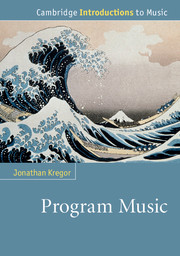Book contents
- Frontmatter
- Contents
- List of Figures
- List of Music examples
- List of Tables
- Acknowledgments
- Note on the text
- Introduction
- Chapter 1 Characters, topics, and the programmatic battlefield
- Chapter 2 Expression, musical painting, and the concert overture
- Chapter 3 Berlioz and Schumann on music and literature
- Chapter 4 Liszt and the symphonic poem
- Chapter 5 The New German School and beyond
- Chapter 6 Excursus: Faust
- Chapter 7 Programmatic paths around the fin de siècle: Mahler and Strauss
- Chapter 8 Programming the nation
- Chapter 9 “Ars Gallica”
- Notes
- Guide to further reading
- Index
Chapter 4 - Liszt and the symphonic poem
Published online by Cambridge University Press: 05 January 2015
- Frontmatter
- Contents
- List of Figures
- List of Music examples
- List of Tables
- Acknowledgments
- Note on the text
- Introduction
- Chapter 1 Characters, topics, and the programmatic battlefield
- Chapter 2 Expression, musical painting, and the concert overture
- Chapter 3 Berlioz and Schumann on music and literature
- Chapter 4 Liszt and the symphonic poem
- Chapter 5 The New German School and beyond
- Chapter 6 Excursus: Faust
- Chapter 7 Programmatic paths around the fin de siècle: Mahler and Strauss
- Chapter 8 Programming the nation
- Chapter 9 “Ars Gallica”
- Notes
- Guide to further reading
- Index
Summary
In February 1848, the celebrated pianist Franz Liszt assumed his duties full time as Kapellmeister at Weimar, the capital of the Grand Duchy of Saxe-Weimar. Over the previous decade, Liszt had enjoyed some of his most important artistic successes in Paris, Vienna, Berlin, London, Pest, St. Petersburg, and even Constantinople; thus his decision to move to a small town of around twelve thousand citizens must have struck many of his contemporaries as a demotion. But Weimar’s physical size was in inverse proportion to its reputation, as the city could boast of an illustrious group of philosophers, writers, and musicians – including Johann Gottfried Herder, Friedrich Schiller, Johann Wolfgang von Goethe, Johann Sebastian Bach, and Johann Nepomuk Hummel – who had transformed the cultural landscape of Europe in the eighteenth and early nineteenth centuries.
In the course of giving well over one thousand concerts since the late 1830s, Liszt had established himself as an unparalleled virtuoso pianist. By retiring from the hectic life of the concert performer and settling into a routine of composing, conducting, and teaching at Weimar, however, he inaugurated a self-described period of “collection and creation” that he hoped would not only turn Weimar into a “New Athens,” but also put him on par with the cultural elite of the city’s illustrious past. Indeed, by the time he left Weimar for Rome in late 1861 to begin yet another phase in his professional life, Liszt had produced most of his best-known works: the definitive versions of the “Paganini” and “Transcendental” Études, the Harmonies poétiques et religieuses, the first two books of the Années de pèlerinage, the Piano Sonata in B minor, the Faust and “Dante” Symphonies, and a dozen symphonic poems. Yet no less important is how many of these compositions also document his wide-ranging exploration of how to effect an ideal unification of poetry and music – in other words, how to compose programmatically. His output, and to a lesser extent that of Richard Wagner and select students, comprise the core repertory of German program music at mid-century.
- Type
- Chapter
- Information
- Program Music , pp. 99 - 128Publisher: Cambridge University PressPrint publication year: 2015



